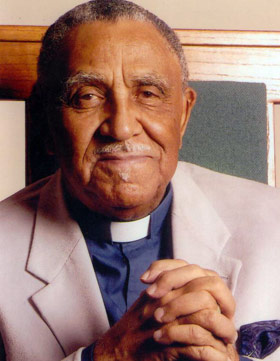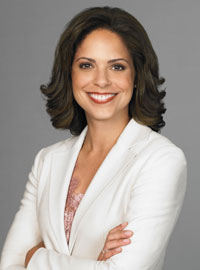Rev. Joseph Lowery to Speak at MLK Ceremony
Speaking Truth to Power
Monday, December 29, 2008
print
|
email
|
![]() digg
|
digg
|
![]() del.icio.us
del.icio.us
The Rev. Joseph Lowery, who has been called the “dean of the Civil Rights Movement,” will make Duke his last stop before heading to Washington, D.C. to give the benediction at President-elect Obama’s inauguration this month. At Duke, he will be the keynote speaker for the university’s Martin Luther King Jr. commemoration.
Lowery’s speech, at 3 p.m. Jan. 18 in Duke Chapel, is part of a program celebrating King’s life. The commemoration’s theme is “What Becomes of the Dream? Faith and Politics, Vision and Leadership” and includes music and dance. It is free and open to the public.
“Dr. Lowery and Dr. King were partners in laying the foundation for the changes that we now see occurring in America’s public life,” said Ben Reese, a King committee co-chair and Duke’s vice president for institutional equity. “His appearance here will give the Duke community an opportunity to reflect on that foundation and inspiration to build upon the principles and tenets of Dr. King.”
Lowery and Martin Luther King Jr. were part of the group that founded the Southern Christian Leadership Conference (SCLC) in Atlanta in 1957. Lowery later served as president of the organization from 1977 to 1998. He was an active partner with King throughout the Civil Rights Movement, leading marches and sit-ins against segregation.
In a recent interview for This Month at Duke, Lowery talked about how he never thought he’d live to see a black president, the work that remains for advocacy groups and why he’s thankful for young people.
Do you believe this moment in history is an evolution of King’s dream?
Yes, I think it certainly is an extension of his vision for America. While I can’t go along with those that say the dream is fulfilled, it certainly is a major, giant step in extending his vision. We have a long way to go. There is no way the election of one person can fulfill the rights of black Americans. We still have economic disparities that plague the country. The median income of black Americans is still somewhere around two-thirds the median income of white Americans. The criminal justice system has been the least impacted by social change. We have a long way to go when you look at what’s going on with poor people in the criminal justice system.
What do you say to college students who may not fully appreciate the struggle of the Civil Rights Movement?
I think that we have to charge educators, particularly people who write curriculum and textbooks, and teachers who want to expand the experiences of their students beyond textbooks, with helping our young people understand the nature of the struggle and its continuance.
Barack’s election doesn’t put an end to the Civil Rights Movement. I don’t know how one election can erase all of the inequities in our country. I think people who talk about post-racial politics are either being devious or jesting, one of the two, because we have not reached the place where we are colorblind. I think we still have to be very intentional about including people of color. Otherwise it won’t happen.
Obama’s election had particular resonance for black Americans, who are still celebrating. Do you think the expectations are too high?
You got to give us a little while to come down. It’s been a long, long journey. To be frank about it, I never thought I’d live long enough to see it. Back in the ‘50s when we started, we thought one day there would be a black president, but not in our lifetime. We fought for voting rights and Martin cried on our behalf, “give us the ballot!” We thought it would happen one day… So we have to celebrate. We’ll come down and get back to normal. And then we’ll probably be demonstrating against Barack the way we did against Clinton and Carter and Reagan and Bush. Power has to be shaken, challenged no matter what its color. The charge of the advocacy community is to speak truth to power and it doesn’t matter what color the power is.
What are you thankful for in 2009?
The election. That America has reached another milestone in her history. We’ve transitioned and broken down a barrier. And the White House is only the White House because of the paint. I am grateful to the spirit of youth which initiated and helped carry the Barack Obama movement. They shouted, ‘yes we can,’ and now they can say, “yes we did.” I thank them for that revival. … I give them a great deal of credit for the excitement.
***
Martin Luther King Jr. Commemoration: Rev. Joseph Lowery
3 p.m. Sunday, Jan. 18, Duke Chapel
Other Events:
Jan. 18 // me too Monologues
Time: 7-9 p.m., Brodie Gym
Jan. 20 // Martin Luther King Jr. Candlelight Vigil
Time: 5-6 p.m., main lobby, Durham Regional Hospital
Jan. 21 // MLK Million Meals Service Event
Time: 5-10 p.m., bus stop near the Chapel, West CampusSign Up
Jan. 23 // Musical Extravaganza - Up Above My Head
Time: 7-9 p.m., auditorium, Durham Regional Hospital
Jan. 23 // Student National Medical Association's MLK Celebration: Ron Claiborne, ABC Good Morning America Weekend News Anchor. Time: 6:30 p.m. Durham Hilton Hotel. For more information, contact Maureen Cullins at mcullins@duke.edu
For a full schedule of commemoration events, go to mlk.duke.edu.





